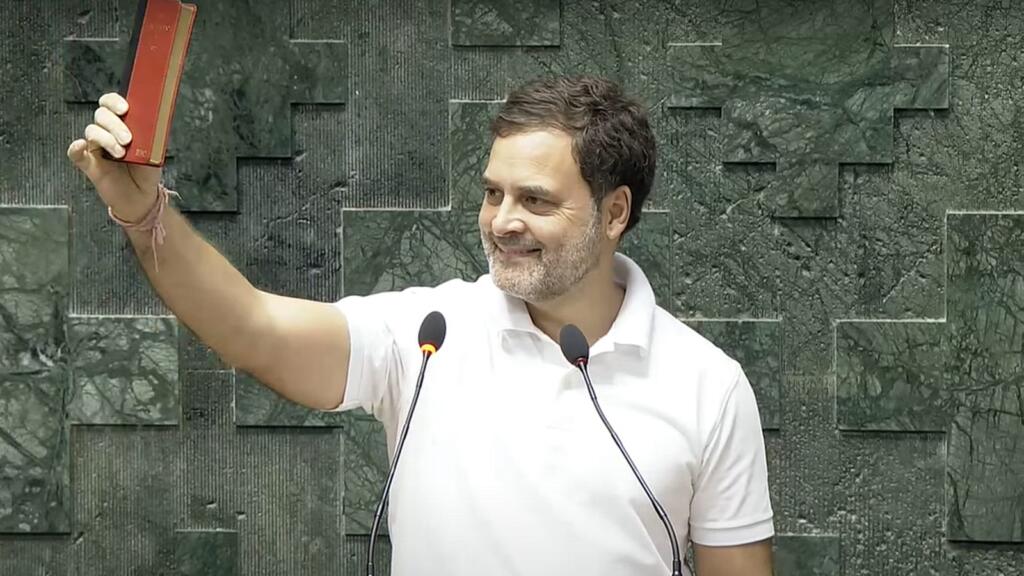The recent Parliament session, the first after the 2024 Lok Sabha elections, was marked by high spirits and a renewed sense of purpose among Congress leaders. Despite a decline in BJP/NDA seats, Congress showed a notable improvement, almost reaching the 100-seat mark. This boosted the confidence of the I.N.D.I Alliance leaders. The scenes during the oath-taking ceremony of the newly elected MPs ranged from inspiring to contentious, depending on one’s perspective. Notably, Rahul Gandhi, after two decades in active politics, assumed the role of Leader of Opposition.
It is not easy for Congress to win in the 2029 elections because BJP’s poor performance was not due to a voter shift but several other factors.
Complacency and Overconfidence
The primary factor is complacency. During the previous elections, the BJP’s slogan ‘Abki Bar 400 Par’ (This time, we will cross 400 seats) instilled a sense of certainty among party supporters that a victory was guaranteed. This overconfidence led many voters to believe their individual votes were unnecessary, resulting in lower voter turnout. This phenomenon likely contributed significantly to the reduced vote percentage.
Voter Inactivity
This complacency resulted in reduced voter turnout, despite a small numerical difference. This indicates a lack of voter engagement and participation, which is crucial in influencing election outcomes. Voter inactivity poses a serious threat to democracy as it affects election results and undermines the democratic process’s credibility.
Lower Seat Outcomes
The First-Past-The-Post (FPTP) system also played a role in the BJP’s significantly lower seat count, despite a narrow vote margin, due to its winner-takes-all nature. In FPTP, the candidate with the most votes in a constituency wins, regardless of the overall vote distribution. Thus, even if the BJP lost by small margins in numerous constituencies, it received no seats in those areas. As a result, while the aggregated vote share might appear close, the seat count can be disproportionately low. This system magnifies minor vote differences into substantial disparities in legislative representation, affecting the BJP’s overall seat tally.
Anticipating Future Parliamentary Dynamics
The actions of the MPs in both the Lok Sabha and Rajya Sabha suggest that the coming years will witness significant turbulence and intense debates in Parliament. Despite a poor showing with just 44 seats in the 2014 elections, Congress has always been capable of creating significant political noise. This was evident when Prime Minister Narendra Modi had to retract land reform proposals and when Parliament was disrupted following the tragic suicide of student Rohit Vemula in Hyderabad.
Congress’s Role as Opposition
Congress has every right to vigorously oppose the government. The party’s leaders seem divided into two camps: one believes the Modi government could collapse under constant pressure, while the other thinks that relentless attacks will weaken the government well before 2029, making it easier for Congress to return to power. In politics, anything is possible.
The Importance of Strengthening Grassroots
For Congress to form a stable government at the Centre, it needs to win at least 150 seats in the Lok Sabha and reduce the BJP to a similar number. The recent performance in the 2024 elections could be a false dawn unless Congress strengthens its grassroots and organizational structure in key states. Without significant grassroots support, surpassing the BJP’s tally in future elections remains unlikely. While Congress might form a government as it did in 2004, the BJP’s numbers would still be considerable.
Direct Contests with BJP
In states like Madhya Pradesh, Chhattisgarh, Karnataka, Gujarat, and Rajasthan, Congress and BJP face direct competition. These states send 119 members to the Lok Sabha, and in the 2024 elections, Congress won only 19 of these seats. To overtake BJP in 2029, Congress needs to win at least 60 out of these 119 seats, which means significantly diminishing BJP’s dominance.
Challenges Ahead
While optimistic supporters believe replicating the 2004 success is possible, the 2024 results indicate otherwise. Despite setbacks in several states, BJP secured 240 seats, more than the I.N.D.I Alliance’s 232. Congress needs to rebuild its grassroots base in major states to regain electoral relevance. This requires dedicated effort and may not always capture headlines. Strong opposition to BJP is beneficial for visibility and energizing the voter base, but winning elections demands more than just making headlines.
ALSO READ: U.S. Bill Challenges China’s Claim on Tibet
